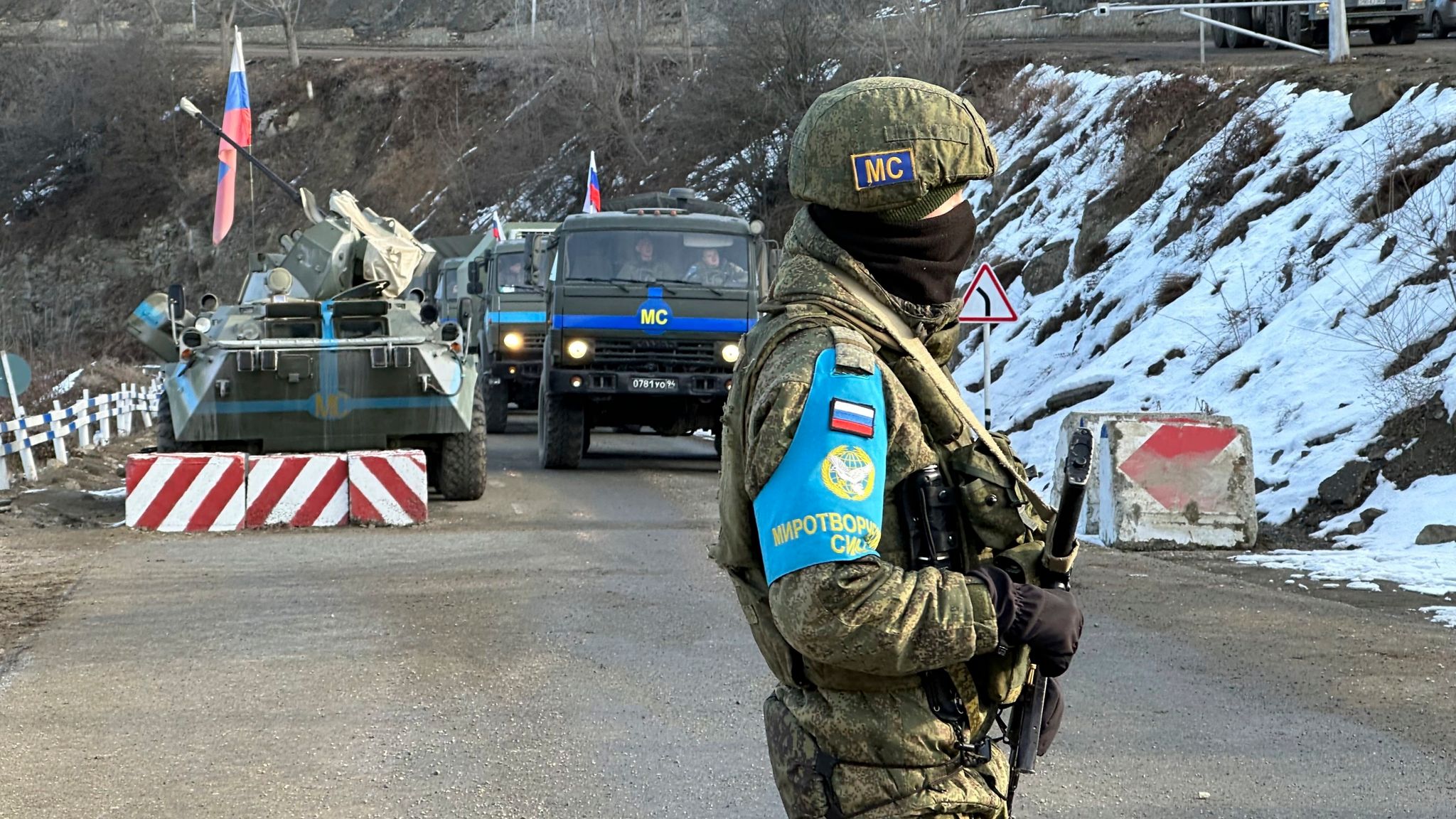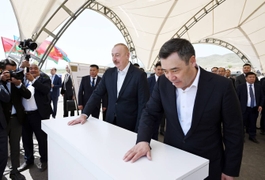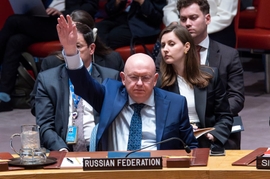Russian peacekeeping forces, deployed in the Karabakh (Garabagh) region of Azerbaijan since 2020, have commenced their withdrawal from the area.
According to Hikmet Hajiyev, Assistant to Azerbaijani President, Head of Foreign Policy Affairs Department of the Presidential Administration, the exit process has already begun.
“The early withdrawal of Russian peacekeepers, temporarily stationed in the territory of the Republic of Azerbaijan, in accordance with the trilateral Statement signed on November 10, 2020, has been decided by the leaders of both countries. The process has already begun, with the ministries of defense of Azerbaijan and Russia implementing appropriate measures for the execution of that decision,” Azertag quoted Hajiyev as saying.
The first group of peacekeepers vacated the observation post at the Khudavang monastery complex in the Kalbajar region, officially handing it over to Azerbaijani police. The withdrawal effort also includes the evacuation of their headquarters in the town of Khojaly.
The entire process is expected to be completed within the next few days.
Social media also circulated footage on Tuesday, showing a convoy of peacekeepers leaving the Karabakh region.
In a press briefing on Wednesday, Russian President’s Spokesperson Dmitry Peskov confirmed the withdrawal process of the peacekeepers from the Karabakh region.
The Russian peacekeepers have been present in the Karabakh region since November 2020, after Armenia and Azerbaijan agreed to cease hostilities through Russia’s mediation.
Armenia and Azerbaijan had been locked in a bloody conflict, which began in the late 1980s. The growing anti-Azerbaijan sentiments in Armenia were based on illegal claims to Azerbaijan’s historic Karabakh region. Following the dissolution of the Soviet Union in 1991, Armenia launched a full-scale military aggression against Azerbaijan. The bloody war, which lasted until a ceasefire in 1994, resulted in Armenia occupying 20 percent of Azerbaijan’s internationally recognized territories. This occupation led to the deaths of over 30,000 Azerbaijanis and the expulsion of one million in a brutal ethnic cleansing campaign conducted by Armenia.
The conflict escalated on September 27, 2020, when Armenian forces illegally deployed in the occupied Azerbaijani lands began shelling military positions and civilian settlements of Azerbaijan. The Azerbaijani army promptly launched a counter-offensive to repel Armenia’s attack, liberating over 300 settlements, including the cities of Jabrayil, Fuzuli, Zangilan, Gubadli, and Shusha, from nearly 30 years of illegal Armenian occupation.
The war concluded with a tripartite statement signed on November 10, 2020, by Armenia, Azerbaijan, and Russia. Under the statement, Armenia also returned the occupied Aghdam, Kalbajar, and Lachin districts to Azerbaijan. As part of the agreement, a Russian peacekeeping mission was deployed in certain parts of the Karabakh region for five years. Their primary responsibility was monitoring and ensuring adherence to the peace in the region.
Concerns against the Russian peacekeepers have been raised multiple times, for their failure to enforce assigned tasks. For instance, Paragraph 4 of the tripartite statement mandated the peacekeepers to ensure the immediate withdrawal of the Armenian army formations from the Karabakh region; however, this went unfulfilled.
Moreover, the post-war situation in the Karabakh region remained fragile due to frequent armed provocations by the Armenian military and illegal armed formations in the region. Azerbaijani army positions in the liberated territories, including the posts on the conditional border with Armenia, were targeted almost daily, leading to periodical fatal escalations, including the bloody border clashes in 2021 and 2022.
The peacekeepers were also observed accompanying illegal arms shipments from Armenia to the Karabakh region, despite warnings from Azerbaijan.
After Azerbaijan regained full control over the Lachin road in April 2023, the peacekeepers and illegal Armenian armed groups in the region were seen using dirt roads to bypass the Lachin highway for illegal arms transfers.
Meanwhile, the illegal Armenian separatist forces in the Karabakh region intensively fortified their positions and strongholds with materiel supplied by Armenia. Despite the continuous warnings by Baku, neither the peacekeepers nor the separatist troops addressed the legal demands.
Azerbaijan Armed Forces conducted local anti-terrorist measures on September 19-20, 2023, to neutralize illegal Armenian armed formations and their military infrastructure in the Karabakh region.
Following the collapse of the illegal Armenian separatist regime, the necessity for peacekeepers in the Karabakh region has diminished due to the restored peace. Consequently, dozens of their observation posts were closed after the Azerbaijani military regained full control of the region in September 2023.







 President Ilham Aliyev shed light on the evolving contours of the peace process with Armenia during an international conference in Baku this week. ...
President Ilham Aliyev shed light on the evolving contours of the peace process with Armenia during an international conference in Baku this week. ...
 Azerbaijan and Armenia started the process of demarcation of their border on Tuesday, with the installation of the first border markers based on ge...
Azerbaijan and Armenia started the process of demarcation of their border on Tuesday, with the installation of the first border markers based on ge...
 Iranian President Ebrahim Raisi expressed Tehran’s readiness to participate in significant development projects in Sri Lanka during the inauguratio...
Iranian President Ebrahim Raisi expressed Tehran’s readiness to participate in significant development projects in Sri Lanka during the inauguratio...
 Turkmen President Serdar Berdimuhamedow and British Secretary of State for Foreign Affairs, Commonwealth Affairs, and Development David Cameron dis...
Turkmen President Serdar Berdimuhamedow and British Secretary of State for Foreign Affairs, Commonwealth Affairs, and Development David Cameron dis...



